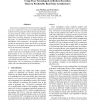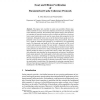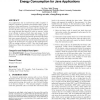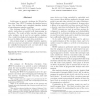166 search results - page 8 / 34 » Efficient worst case timing analysis of data caching |
RTAS
2008
IEEE
14 years 2 months ago
2008
IEEE
Instruction scratchpads have been previously suggested as a way to reduce the worst case execution time (WCET) of hard real-time programs without introducing the analysis issues p...
CHARME
2003
Springer
13 years 11 months ago
2003
Springer
Abstract. We propose new, tractably (in some cases provably) efficient algorithmic methods for exact (sound and complete) parameterized reasoning about cache coherence protocols. F...
CASES
2008
ACM
13 years 9 months ago
2008
ACM
Java applications rely on Just-In-Time (JIT) compilers or adaptive compilers to generate and optimize binary code at runtime to boost performance. In conventional Java Virtual Mac...
RTCSA
1999
IEEE
13 years 12 months ago
1999
IEEE
In this paper we present a technique for Worst-Case Execution Time WCET analysis for pipelined processors. Our technique uses a standard simulator instead of special-purpose pipel...
IPCCC
1999
IEEE
13 years 12 months ago
1999
IEEE
Many computer hardware and software architectures buffer data in memory to improve system performance. Volatile disk or file caches are sometimes used to delay the propagation of ...




